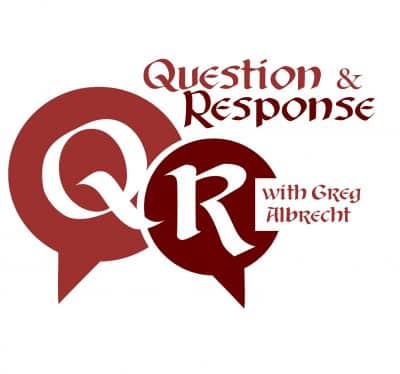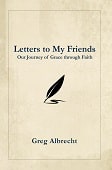What Then Can We Learn? – Greg Albrecht

QUESTION:
Does Jesus speak to us about being prepared in a physical sense like storing extra food away or buying silver or gold? My wife wants us to start doing this. She believes there are verses that speak to this. Thanks for your response!
RESPONSE:
Some of the more contemporary Bible translations divide portions of chapters into subheads. The New International Version (NIV) suggests “Do Not Worry” as the subhead for Matthew 6:25-34. The New King James (NKJ) suggests more verses in this last section of the sixth chapter of Matthew, with the subhead “Treasures on Earth” for Matthew 6:19-34. Matthew 6:19 records the words of Jesus as saying, “Do not lay up treasures on earth, where moth and rust destroy, where thieves break in and steal…” going on to suggest that Christ followers lay up treasures in heaven, “for where your treasure is, there will your heart be also” (Matthew 6:21).
The beginning of the subhead “Do Not Worry” suggested in the NIV is Matthew 6:25, which reports the words of Jesus as “do not worry about your life, what you will eat or drink; or about your body, what you will wear.”
When a person asked Jesus to mediate in a dispute about an inheritance, he responded with the parable of the Rich Fool (Luke 12:13-21) in which the crops of a rich farmer yielded so much that he had no place to store everything, so he built bigger barns, to store his surplus grain, assuring himself that he was now secure. Jesus then says, “But God said to him, ‘You fool! This very night your life will be demanded from you. Then who will get what you have prepared for yourself?’” (Luke 12:20).
There is no question that fear is a tool utilized by many to prompt certain actions on the part of those they wish to manipulate and “lead” – this includes all sorts of advertising, the media at large, politics and politicians and Christ-less religion, to name but a few. But the gospel of Jesus Christ is not at all about fear – rather it is about the peace of God and rest in Christ. No where do we read in the New Testament that Christ-followers are urged to live in a perpetual state of anxiety, fear and worry – but rather the opposite.
Of course we should prepare for the needs of our family and our loved ones – there are passages that speak to such a responsibility as being one of the ways we demonstrate love to our family – love to our neighbors, if you will. But what is popularly called “Disaster Preparedness” is not part of the gospel message. That said, we all have decisions to make about the future and our preparation for it – insurance, living wills and trusts, provision for the future when we are no longer alive. We have decisions to make about being ready for a disaster like a flood or earthquake or another calamity – the Bible nowhere demeans such preparation, but it suggests that a solitary and primary focus on preservation of our lives is to divert attention and focus from Jesus.
Many in the name of God, have made great “hay” for many hundreds of years advising their constituents and followers to prepare to prolong their physical lives when their particular area of the world goes to hell in a hand-basket. In his second epistle Peter suggests that false prophets and teachers will “…in their greed … exploit you with fabricated stories” (2 Peter 2:3). Much of the bedrock of such false teaching is that the era in which such teaching is selling like hotcakes is “the end time.” But the end time, according to prophecy prognosticators, has been going on for a LONG TIME – while there were times when such teaching was popular before the early 1800s, it was about two hundred years ago when such “end times” preaching really started to ramp up.
It’s a message of fear – it’s a message of saving one’s own neck – it’s a message that never fails to gain many listeners and followers. ALL teachers who have taught such a message are dead and buried (saving those alive today who will one day follow them) and Jesus still has not returned, in his Second Coming. What then can we learn from the facts of history?
In 1999 many well known ministries and churches taught that the world would melt down as the new millennium started because of a computer inadequacy that did not provide enough digits to accommodate the 21st century. Some advised (a matter of historical record) that people sell their homes in big cities, buy a piece of land in a rural area, buy freeze dried food (conveniently, some ministries and churches had a good deal on such food), dig a well, seemingly, covertly if not overtly, suggesting the purchase of weapons for protection (Jesus however said to a disciple who drew a sword and cut off the ear of one of those who came to arrest, torture and crucify Jesus, “Put your sword back in its place…all who draw the sword will die by the sword” (Matthew 26:52).
In 1999 Plain Truth Ministries warned of this unbiblical and un-Christ-like teaching, in no uncertain terms, with many articles and a cover story in our magazine, that such teaching was flawed and filled with fear. I remember driving by churches in the summer and fall of 1999 where huge semi trailers were parked, with disaster supplies members of that church could purchase after services. What then can we learn?
It seems that Jesus tells us not to worry, not to store up treasures on this earth where moth and rust corrupts, and rather than primarily focusing on ways to perpetuate and secure our lives via the “bigger barns” of the Rich Fool, to put down our swore and pick up our cross and follow him. The Christ-follower hopes and dreams of another world, a “city with foundations, whose architect and builder is God” (Hebrews 11:10). This is our faith, and we love God and our neighbor, with self sacrificial love. Jesus, his cross, his resurrection, his risen life in us, is our focus.
If one believes a particular speculation about the “end time” and lives one’s life by it only to see such speculations crash, over and over again, then one may well be living a life of fear and falsehoods which are produced by fear and prediction addictions, and it may well be one is well served to abandon such a teaching and the erroneous propositions it presents. After all, one definition of insanity is to repeat an action over and over and over again, with the action always failing to deliver the desired result, but always “hoping” that somehow a different result will happen, this time. What then can we learn? Perhaps we can learn from Paul, as he says, “Since then, you have been raised with Christ, set your hearts on things above, where Christ is, seated at the right hand of God. Set your hearts on things above, not on earthly things” (Colossians 3:1-2).









 Plain Truth Ministries | Box 300 | Pasadena, CA 91129-0300
Plain Truth Ministries | Box 300 | Pasadena, CA 91129-0300

